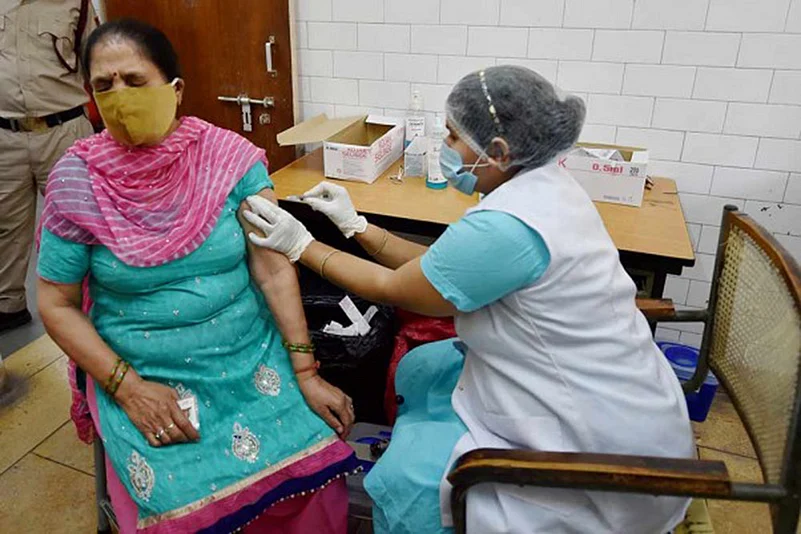India on Monday registered a record single-day rise of 2,73,810 new Covid-19 infections. Amid this second wave of the pandemic, many states are facing a shortage of hospital beds for coronavirus patients, oxygen cylinders and remdesivir injections, an antiviral drug used in the treatment of Covid-19.
Researchers believe that one of the key factors responsible for this Covid-19 resurgence in India is the increased rate of reinfections.
According to health and development economist Professor Anup Malani, Covid-19 vaccines do not hinder one from getting infected but rather they help in curing the disease at a faster rate and reduce its severity.
Malani, a professor at the University of Chicago Law School and the university's Pritzker School of Medicine, has been leading a series of Covid-19 serosurveys in cities and states across India with economic development-focused think-tank IDFC.
In an interview with PTI, Malani said, "I fear this is the biggest misunderstanding around India and even in other countries today. Previous infection and vaccines do not stop you from being infected. That was never how immunity worked. Instead, natural and vaccine-acquired immunity is helpful because it helps you clear the infection faster once you are infected."
"This has two benefits – it helps you avoid death or other serious health harm from the infection, and it helps reduce the probability you will infect someone else. So it is possible to be reinfected, but the harms of the infection will be lower," he said.
The level of reinfection in the population depends on the prevalence of the infection and the prevalence of immunity, natural or vaccine acquired, Malani said.
"The level of reinfection is driven up by more activity (like large gatherings), and down by immunity rates. What may be going on in India is that activity recently increased at a faster rate than immunity. This is the most optimistic interpretation of the surge,” he said.
Indian Council for Medical Research (ICMR) Director General Balram Bhargava earlier this month had said that reinfection of cases are around one per cent.
"We have studied the data of reinfection cases in India. Globally, reinfection cases are around 1 per cent,” he had said.
India is battling to a massive surge in Covid-19 cases.
The number of new coronavirus cases hit a record daily high since the outbreak of the pandemic with 2,73,810 new infections being reported in a span of 24 hours, pushing the nationwide Covid-19 tally to 1,50,61,919 according to health ministry data updated on Sunday.
Malani said there can be two possibilities behind the recent surge in cases – one is people are not wearing masks and gathering, and the other is emergence of new strains of the coronavirus.
“First is that people are not wearing masks and gathering more. The second is that there are new strains that are more transmissible. But the question we must ask is why people are more non-compliant now? Is it that they are just tired of COVID, or they think the vaccination campaign is reducing risk -- even if they personally are not vaccinated -- or fatality rate has fallen as more people are naturally immune,” he said.
On ways to tackle the second wave, Malani said wearing masks, more testing, tracking peoples' recovery or death, and sequencing positive cases can be among the ways to handle the surge.
“What is best to do in response to the surge really depends on what the explanation is for the surge. If the optimistic explanation is correct (that is activity increased faster than immunity in February and March), then the solution is that we should increase vaccination," he said.
The health and development economist said raising immunity levels is better than reducing activities like gatherings as he fears that people are less compliant with or tolerant of lockdowns now.
"If the pessimistic scenario holds, which is new strains have emerged and existing or vaccine immunity is less effective against them, and so they have the same or higher infection fatality rate, then we have to start first with lockdowns. But we should be smarter about them," Malani said, adding that previously, "we seemed to mainly want to stop activities".
The aim should be to stop crowding, "while contact tracing and quarantining are helpful, it also causes people to avoid being tested or reporting symptoms. This can just mask the problem", he said.
On nationwide lockdown, Malani said lockdowns seem to harm the poor more than the rich.
"But the new thing we've discovered is that lockdowns can cause people to move to escape them. Perhaps we will see lockdowns in Maharashtra causing people to leave the state to return to their ancestral homes in other states. This could actually increase crowding at train stations and thus, the level of infection," he said.
"It could also spread the infection. If a national and abrupt lockdown is not possible, and I don't think it is feasible, then we need to use more intelligent strategies. Wearing masks is the easiest. We can engage in economic activity and mask, so opposition to this form of control should be less,” he said.
Maharashtra is among the 12 high-burden states in the country. Delhi, Uttar Pradesh and Chhattisgarh are also part of this group.
The number of active coronavirus cases in the country has surpassed the 18-lakh mark, the health ministry's data showed.
Registering a steady increase for the 40th day in a row, the tally of active Covid-19 cases has climbed to 19,29,329 in the country, accounting for 12.81 per cent of its total caseload, while the national Covid-19 recovery rate has dropped to 86 per cent.
















